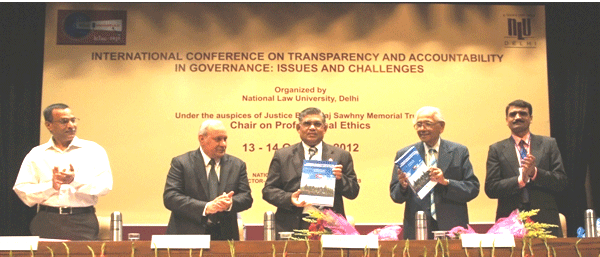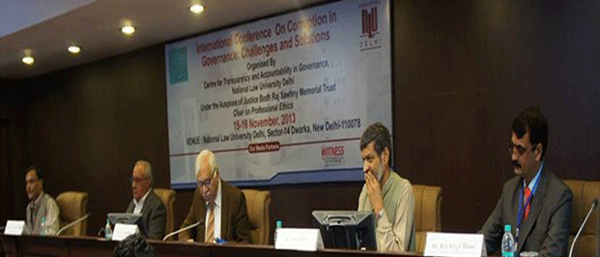Centre for Transparency and Accountability in Governance

National Law University Delhi (NLU) organized a two days international Conference on Transparency and Accountability in governance: issues and Challenges from 13 October to 14 October 2012. The Conference received an overwhelming response from all strata of society. The conference had received 266 abstracts of research papers. It was quite impossible to include all abstract in the event. Screening Committee approved 115 abstracts, taking into account quality research and variety in research. The Conference began with welcome address by the Prof (Dr) Ranbir Singh, Vice Chancellor, NLU Delhi. Inaugural Address was delivered by Hon’ble Mr. Justice D. Murugesan, Chief Justice of Delhi High Court & Chancellor, NLU Delhi. Hon’ble Mr. Justice J S Verma, Former Chief Justice of India & Chair Professor on Professional Ethics, NLU Delhi delivered key note address on the occasion. Conference proceedings, edited by the Editorial Committee Chaired by the Conference Convener Dr J S Mann, in two volumes, were also released by the respected dignitaries on the occasion.
The Conference provided an international platform to all stake holders to address contemporary issues pertaining to accountability and transparency in governance. The conference was divided into five main technical sessions covering important contemporary issues. The conference deliberated upon some important burning issues such as freedom of information activism, judicial standards and accountability, ombudsman(Indian version : Lokpal and Lokayuktas), right to public services, whistleblower protections, e-governance, public hearings on public interest matters, and ethics in governance.
The Conference was addressed by a galaxy of imminent speakers from different specializations. The Prominent speakers presided over various technical sessions. The Galaxy of imminent speakers included Hon’ble Justice JS Verma, Former Chief Justice of India, Shri Soli Sorabjee, Senior, Advocate Supreme Court, Shri P P Rao, Senior Advocate, Supreme Court of India, Justice Santosh Hegde, Former Judge of the Supreme Court and Former Lokayukta of Karnataka, Justice G C Bharuka, former Judge High Court of Karnataka, Ms Kiran Bedi, Leading Social Activist and former IPS Officer, Dr. T.K. Viswanathan, Secretary General Lok Sabha, Parliament of India, Prof Bharti Sharma, Head Centre for Ethics in Governance, IIPA New Delhi, Shri PS Bawa, Chairman Transparency International India, New Delhi, Prof.(Dr.) M P Singh, Director, Delhi Judicial Academy, Prof. (Dr.) B B Pande, former Professor of Law, DU, Prof (Dr) Paramjit S Jaswal VC, RGNUL, Patiala, Prof(Dr.) V. Vijayakumar, VC, Tamil Nadu Dr. Ambedkar Law University, Chennai, Shri Wajahat Habibullah, Chairman, Minority Commission of India and Founder Chief Information Commissioner, Government of India, Mr. S C Agrawal, leading RTI Activist, Prof. Manohar, Special Officer, Tamil Nadu National Law University, Prof. (Dr.) Satish C Shastri, Mody University, Lakshmangarh, Rajasthan, Prof KPS Mahalwar, MDU Rohtak, Prof A Wani, GGSIPU, Delhi, Prof. (Dr.) B.T. Kaul, DU, Prof C Raj Kumar, VC, Jindal Global University and Prof. K Elumalai, Director, School of Law, IGNOU New Delhi,
Justice JS Verma, former chief justice of India, Shri Soli Sorabjee emphasized the urgent need of law on judicial accountability of judiciary. Shri PP Rao criticized the prolonged and complicated process of impeachment of judges. According to him the process must be simplified. Justice Santosh Hegde stressed the requirement of covering judiciary with in the ambit of Lokpal intuition to curb corruption in judiciary. Ms Kiran Bedi recommended the necessity of a strong Lokpal and Lokayukta at appropriate levels. Justice G.C. Bharuka examined the significance of E-Court system in India in order to reduce pendency of litigations pending before various judicial and quasi- judicial authorities. Dr. T.K. Viswanathan discussed the importance of governance and how to ensure transparency and accountability in governance. Mr. Wajahat Habibullah recommended that the RTI Scheme should be extended to private sector also. Mr. Habibullah was of the view that people are actually using RTI as a threat. Mr. S.C. Aggrawal shared his experiences with regard to RTI filing and proceedings. According to him the RTI has given second freedom to the people of India. He also suggested that a chapter must be devoted to RTI in school curriculum.
Participants from various disciplines such as, law, management, political science, economics, public administration, sociology, practicing advocates from Supreme Court and High Courts, social Activist, etc, deliberated up on the issues on transparency and accountability in governance. The valedictory speech was delivered by Dr. Justice B S Chouhan, Judge Supreme Court of India.
International Conference on Corruption in Governance: Challenges & Solutions by the CTAG, National Law University Delhi
The Centre for Transparency and Accountability in Governance (CTAG) National Law University Delhi organized a two days International Conference on Corruption in Governance: Challenges & Solutions from 15 October to 16 November 2013. The Conference received an overwhelming response from all strata of society. The conference had received 77 quality research papers along with abstracts It was quite impossible to include all abstract in the event. Screening Committee approved 35 research papers, taking into account quality research and variety in research. The Conference began with welcome address by the Prof (Dr) Ranbir Singh, Vice Chancellor, NLU Delhi. Inaugural Address was delivered by Dr. S Y Quraishi, Former Chief Election Commissioner. Mr. Nikhil Dey, National Campaign for Protection of Right to Information (NCPRI) delivered key note address on the occasion. A detail of Conference proceedings was highlighted by the Conference Convener, Dr J S Mann. Prof S K D Rao, Registrar& Professor of Law, National Law University, Delhi delivered vote of thanks on the occasion.
The Conference provided an international platform to all stake holders to address contemporary issues pertaining to accountability and transparency in governance. The conference was divided into six main technical sessions covering important contemporary issues on corruption. The conference deliberated upon some important burning issues such as Trans-National Corruption: Challenges and Solutions, Corruption in Public Life; Public Servants, Services, Ethics, Enforcement Laws Etc; Accountability of Law and Order Enforcement Mechanism: Police, CBI, CVC, Anti-corruption Agencies, etc; Electoral Processes & Accountability of Elected Representatives; Transparency and Accountability endeavours and Corruption in Governance, and Accountability And Transparency In Judiciary.
The Conference was addressed by a galaxy of imminent speakers from different specializations. The Prominent speakers presided over various technical sessions. The Galaxy of imminent speakers included Hon’ble Justice Santosh Hegde, Former Judge of the Supreme Court and Former Lokayukta of Karnataka, Justice Manmohan Sarin, Former Lokayukta, State of Delhi , Shri P. K. Tripathi , Chairman, Delhi Public Grievances Commission, New Delhi , Justice G C Bharuka, former Judge High Court of Karnataka, Shri K J Rao, General Secretary, FAME & Former Advisor to Election Commission Of India, Ms Kiran Bedi, Leading Social Activist and former IPS Officer, Shri ML Sharma, Former CBI Officer and Former CIC, Justice K Nath, Chairperson, Transparency International India, New Delhi, Prof.(Dr.) M P Singh, Director, Delhi Judicial , Prof Sachidanandam, Professor of Law, National Law University Delhi , Prof (Dr.) A Jayagovind, Professor of Law, National Law University Delhi, Professor Amar Singh, Director, School of Law, Raffles University Rajasthan, Prof (Dr.) J S Chhokar, Director, Association for Democratic Rights, New Delhi, Prof (Dr.) KNC Pillai, Professor of Law, Shri Manoj Joshi, Joint Secretary, DoPT, Government of India, Prof(Dr.) V. Vijayakumar, Professor, NLSIU, Prof. (Dr.) Heinz Goddar , Honorary Professor at the University of Bremen, Germany & Managing Partner of Boehmert & Boehmert, Law Firm, Germany, Shri Shailesh Gandhi Former Information Commissioner, CIC, Prof. Mu-Fen Chao, Professor, Dept of Business Administration, Tam Kang University, Taiwan, Professor Mei-Hsin Wang, National Yunlin University of Science & Technology, Taiwan, Mr. S C Agrawal, leading RTI Activist, Prof A Wani, GGSIPU, Delhi, Shri Venkatesh Nayak, Programme Coordinator CHRI, and Mr. Ajit Joy, Member NCPRI
Justice Santosh Hegde emphasized the urgent need of law on accountability of public servants. Justice Manmohan Sarin stressed the requirement of covering judiciary within the ambit of Lokpal intuition to curb corruption in judiciary. Ms Kiran Bedi recommended the necessity of police reforms to control corruption in police forces. Justice G.C. Bharuka examined the significance of corruption in judiciary and E-Court system in India in order to reduce pendency of litigations pending before various judicial and quasi- judicial authorities. Shri K J Rao discussed the importance of election reforms and how to ensure transparency and accountability in governance of election processes. Mr. Shailesh Gandhi recommended that the RTI Scheme should be extended to private sector also. Mr. S.C. Aggrawal shared his experiences with regard to RTI filing and proceedings. According to him the RTI has given second freedom to the people of India. He also suggested that a chapter must be devoted to RTI in school curriculum.
Participants from various disciplines such as, law, management, political science, economics, public administration, sociology, practicing advocates from Supreme Court and High Courts, social Activist, etc, deliberated up on the contemporary issue related to corruption in governance. Observations and suggestions recommended by the panelists and paper presenters have been recorded for the purpose of Conference Declaration, which will be sent to the policy makers.



